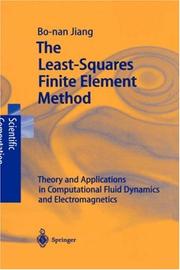| Listing 1 - 1 of 1 |
Sort by
|

ISBN: 3540639349 3642083676 3662037408 Year: 1998 Publisher: Berlin Springer
Abstract | Keywords | Export | Availability | Bookmark
 Loading...
Loading...Choose an application
- Reference Manager
- EndNote
- RefWorks (Direct export to RefWorks)
This is the first book devoted to the least-squares finite element method (LSFEM), which is a simple, efficient and robust technique for the numerical solution of partial differential equations. The book demonstrates that the LSFEM can solve a broad range of problems in fluid dynamics and electromagnetics with only one mathematical/computational formulation. The book shows that commonly adopted special treatments in computational fluid dynamics and computational electromagnetics, such as upwinding, numerical dissipation, staggered grid, non-equal-order elements, operator splitting and preconditioning, edge elements, vector potential, and so on, are unnecessary. This book introduces the basic theory of the least-squares method for first-order PDE systems, particularly the div-curl system and the div-curl-grad system. It is applied to the study of permissible boundary conditions for the incompressible Navier--Stokes equations, to show that the divergence equations in the Maxwell equations are not redundant, and to derive equivalent second-order versions of the Navier--Stokes equations and the Maxwell equations. This book covers diverse applications such as incompressible viscous flows, rotational inviscid flows, low- or high-Mach-number compressible flows, two-fluid flows, convective flows, and scattering waves.
Mathematical statistics --- Differential equations, Partial --- -Electromagnetism --- -Finite element method --- Fluid mechanics --- -Least squares --- 519.6 --- 681.3 *G18 --- Method of least squares --- Squares, Least --- Curve fitting --- Geodesy --- Mathematics --- Probabilities --- Triangulation --- Hydromechanics --- Continuum mechanics --- FEA (Numerical analysis) --- FEM (Numerical analysis) --- Finite element analysis --- Numerical analysis --- Isogeometric analysis --- Electromagnetics --- Magnetic induction --- Magnetism --- Metamaterials --- Partial differential equations --- Numerical solutions --- Computational mathematics. Numerical analysis. Computer programming --- Partial differential equations: difference methods; elliptic equations; finite element methods; hyperbolic equations; method of lines; parabolic equations (Numerical analysis) --- Electromagnetism --- Finite element method. --- Least squares. --- Numerical solutions. --- Mathematics. --- 681.3 *G18 Partial differential equations: difference methods; elliptic equations; finite element methods; hyperbolic equations; method of lines; parabolic equations (Numerical analysis) --- 519.6 Computational mathematics. Numerical analysis. Computer programming --- Physics. --- Continuum physics. --- Optics. --- Electrodynamics. --- Calculus of variations. --- Computer mathematics. --- Fluids. --- Numerical and Computational Physics, Simulation. --- Classical and Continuum Physics. --- Classical Electrodynamics. --- Calculus of Variations and Optimal Control; Optimization. --- Computational Science and Engineering. --- Fluid- and Aerodynamics. --- Hydraulics --- Mechanics --- Physics --- Hydrostatics --- Permeability --- Computer mathematics --- Electronic data processing --- Isoperimetrical problems --- Variations, Calculus of --- Maxima and minima --- Dynamics --- Light --- Classical field theory --- Continuum physics --- Natural philosophy --- Philosophy, Natural --- Physical sciences
| Listing 1 - 1 of 1 |
Sort by
|

 Search
Search Feedback
Feedback About
About Help
Help News
News